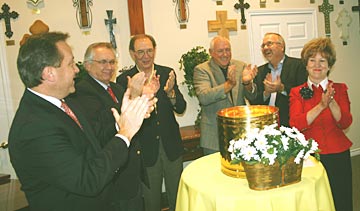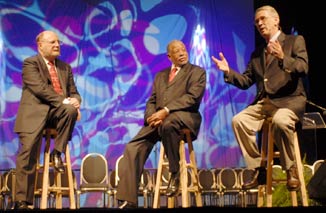2007 Archives
-
Free from debt, Breckenridge now free to focus on ministry
Posted: 7/06/07
Baptist leaders applaud the burning copies of the note for Breckenridge Village of Tyler, signifying the facility for adults with developmental disabilities finally is debt-free. Joining in the ceremony are (left to right) Kevin Dinnin, president of Baptist Child & Family Services; Charles Wade, executive director of the Baptist General Convention of Texas; Paul Powell of the Rogers Foundation; Pastor David Dykes of Green Acres Baptist Church in Tyler; Keith Bruce, director of institutional ministries with the BGCT; and Linda Taylor, development director at Breckenridge. (Photos/Craig Bird/BCFS) Free from debt, Breckenridge
now free to focus on ministryBy Ken Camp
Managing Editor
TYLER—Breckenridge Village faced the greatest challenge in its challenge-filled history, but it got by with a little help from its friends. Make that $3.7 million worth of help in 12 months and friends ranging from the Baptist General Convention of Texas to a Jewish family foundation.
Breckenridge Village, a residential community for adults with mild to moderate developmental disabilities, recently retired its building debt in dramatic fashion—offering a new lease on life to the Tyler facility and lifting a burden from the shoulders of its parent agency, Baptist Child & Family Services.

Rosie Simmons (left), who coordinates many of the activities at Breckenridge Village at Tyler, helps Breckenridge resident Deborah with a project. 07/06/2007 - By John Rutledge
-
Baptist Briefs
Posted: 7/06/07
Baptist Briefs
Southwestern Seminary trustee resigns. Dwight McKissic, who frequently has been at odds with fellow trustees at Southwestern Baptist Theological Seminary, resigned from the school’s board. McKissic, pastor of the predominantly African-American Cornerstone Baptist Church in Arlington, was the lone dissenter when trustees voted last October to forbid the seminary from employing professors who advocate speaking in tongues. Earlier, in a chapel sermon at Southwestern, McKissic said that since his days as a student at the seminary, he has used a “private prayer language,” considered by many a variation of tongues-speaking. In March, trustees tried to expel him permanently from the board, a move McKissic called “nothing but a 21st-century lynching.” Trustees later decided not to remove him. The debate over tongues “has taken a tremendous toll on my family and ministry, and my wife believes it has negatively impacted my health,” McKissic said in a letter to Van McClain, chairman of the seminary trustee board. He also said he has been “distracted and consumed” by the controversy and needs to refocus on his family and church.
Baptist college association elects leader. The International Association of Baptist Colleges and Universities board elected Thomas Corts, president emeritus of Samford University, as the association’s executive director. Corts, 65, succeeds Bob Agee, who announced last December he would retire at the June meeting. Corts served as interim chancellor of the Alabama College System last year. Prior to that position, he was president of Samford University from 1983 to 2006. He served previously at Wingate University in North Carolina, the Higher Education Consortium of Kentucky and Georgetown College in Kentucky. Corts is married to the former Marla Ruth Haas. They have three children and six grandchildren.
07/06/2007 - By John Rutledge
-
-
Joint meeting of American Baptists, CBF models newfound cooperation
Posted: 7/06/07
Joint meeting of American Baptists,
CBF models newfound cooperationBy Robert Dilday & Marv Knox
Associated Baptist Press & Baptist Standard
WASHINGTON (ABP)—Worship infused with music and missions, cooperation and communion, and doses of laughter marked a historic reunion of Baptists in the nation’s capital city.
The American Baptist Churches USA and the Cooperative Baptist Fellowship held their first national joint worship service—a long-awaited coming together of Baptists whose shared commitment to missions and Baptist principles once was shattered by slavery.
CBF Executive Coordinator Daniel Vestal speaks during a panel discussion with ABCUSA General Secretary Roy Medley (left) and Tyrone Pitts, general secretary of the Progressive National Baptist Convention, during the combined CBF/ABCUSA worship service. (CBF Photo/Rod Reilly) 07/06/2007 - By John Rutledge
-
Music bridges racial and cultural gaps
Posted: 7/06/07
Texas Voices of Praise gospel choir from 10 African-American Baptist churches performs with the Fujiyoshida Baptist Church gospel choir before a crowd of 400 people during a mission trip to Japan. Music bridges racial and cultural gaps
By Barbara Bedrick
Texas Baptist Communications
TOKYO—At 26, Kyoko Murakami’s journey of faith began when she started singing with the Tokyo Voices of Praise gospel choir in 1997. She sang about Jesus, but she didn’t know why. For four years, she performed, but she didn’t worship.
In 2001, a Christian friend handed her a Bible and encouraged her to read it. Soon the words and the gospel songs began to touch her heart.

Douglas Edwards, member of Minnehulla Baptist Church in Goliad, sings gospel music with choir members from Chofu Minami Baptist Church at Japan concert hall before an audience of 500 people, most of them not Christians. 07/06/2007 - By John Rutledge
-
2nd Opinion: Following Christ: More than âRedâ
Posted: 7/06/07
2nd Opinion:
Following Christ: More than ‘Red’By Gary Long
Bono and Oprah are two of the most powerful figures in the entertainment business. So, naturally, it caught everyone’s attention when they went “Red.” They are two key celebrities affiliated with the “Red” campaign, an idea to brand products and give proceeds from the sales to fight diseases—specifically HIV/AIDS—in Third World nations.
On the surface, it seems like a good idea to “do the ‘Red’ thing.” Bono explained the campaign to Relevant magazine: “Some people won’t put on marching boots, so we’ve got to get people where they are at, and they’re in the shopping malls. Now you’re buying jeans and T-shirts, and you’re paying for 10 women in Africa to get medication for their children with HIV.”
But my concerns are several:
07/06/2007 - By John Rutledge
-
DOWN HOME: A terrific ride for a good, long talk
Posted: 7/06/07
DOWN HOME:
A terrific ride for a good, long talkIf our family vacation had a theme this year, it would have been “riding.”
We rode the family sedan out past West Texas, across New Mexico and up into the Colorado mountains. When we got there, we rode the rapids in a raft, rode over a pass in a train and rode through mountain meadows on the backs of horses. When the time came to leave, we rode our car back down out of the mountains, west across the mesas and plains of New Mexico, south through the Texas Panhandle and, deep into the night, back to our home near Dallas.
Except for the time we paid about $3.50 per gallon to fill our gas tank, we had a terrific trip.
Some people prefer to fly when they go to the mountains or the beach. I freely acknowledge they have a point: Both peaks and waves are a long, long way from here. In theory, flying is best. Except for three facts:
07/06/2007 - By John Rutledge
-
EDITORIAL: Think about immigration & Jesus
Posted: 7/06/07
EDITORIAL:
Think about immigration & JesusDon’t you wish America’s political leadership had an ounce of moral imagination? The Senate’s failure to improve our immigration system represents a new low in legislative ineffectiveness. (Coming from someone who’s watched the Texas Legislature at un-work, that’s a mouthful.) One side wanted reform. But even with support from the president and top members of both parties, they couldn’t put together a plan to answer basic concerns, much less build a victorious coalition. Not to be outdone, the other side behaved just as badly. They waved the flag of fear long enough to beat back the reformers. Yet their warnings about “amnesty” for “illegal immigrants” rang hollow when they failed to offer an option for alleviating the problem.

So, now what do we have? Something to scare and/or trouble almost everyone: Porous borders. Between 12 million and 14 million undocumented workers living in the United States. Strained social services, particularly in the Southwest. Industries vital to our economy—such as agriculture and construction in the Southwest, textiles in the Southeast—dependent upon cheap labor. Thousands, if not millions, of workers who are vulnerable and exploited. Thousands, perhaps millions, of U.S. workers whose job status and/or income is affected by competition from immigrant workers. Families torn apart. Millions of citizens angry and confused by the dramatic changes they’re seeing in their culture and communities.
Meanwhile, back in Congress … . Well, nothing.
Common sense has sprung from other quarters, however. In a Wall Street Journal column, Peggy Noonan, the former Reagan White House speechwriter, laid out a two-step solution that’s profoundly simple: Secure the borders. Admit the workers we need.
07/06/2007 - By John Rutledge
-
Faith Digest
Posted: 7/06/07
Faith Digest
Polluted lower Jordan River an endangered site. The lower portion of the Jordan River is so polluted, the World Monuments Fund has designated it an “Endangered Cultural Heritage Site.” The international body for the protection of monuments recently placed the river revered by Jews, Christians and Muslims on the organization’s “watch list” of 100 endangered sites. About 90 percent of the river’s natural water flow has been diverted by Israel, Jordan and Syria for domestic and agricultural use, with sewage flowing in its place, according to Friends of the Earth Middle East, an environmental organization with offices in Israel, Jordan and the Palestinian Authority.
Network takes over struggling biblical theme park. Trinity Broadcasting Network has become the new owner of the Holy Land Experience, a biblical theme park in Orlando, Fla. The ownership change came as five members of the network’s leadership team—including TBN founders Paul and Janice Crouch and their son—were announced as new board members of the theme park. The Orlando Sentinel reported the tourist attraction—which features music, drama and portrayals of Jesus’ ministry, death and resur-rection—has experienced financial troubles and declining attendance.
07/06/2007 - By John Rutledge
-
U.S. Hispanic believers prefer âSpirit-filledâ worship in Spanish
Posted: 7/06/07
U.S. Hispanic believers prefer
‘Spirit-filled’ worship in SpanishBy Ted Parks
Associated Baptist Press
WASHINGTON (ABP)—Hispanic believers in the United States prefer “Spirit-filled religious expression” and gravitate toward a “distinctively ethnic” worship experience, opting to go to church with other Hispanics and speak Spanish when they get there, according to a recent report by the Washington, D.C.-based Pew Hispanic Center.
Titled “Changing Faiths: Latinos and the Transformation of American Religion,” the Pew study suggests more than half of Latino Catholics in the United States, 54 percent, are charismatic or Pentecostal, with the proportion of charismatic and Pentecostal believers even larger among Latino Protestants, at 57 percent.
07/06/2007 - By John Rutledge
-
Scholar mulls the possibilities of U.S. relations with Muslims
Posted: 7/06/07
Scholar mulls the possibilities
of U.S. relations with MuslimsBy Omar Sacirbey
Religion News Service
WASHINGTON (RNS)—What if, Akbar Ahmed asks, America had limited its military response to 9/11 to liberating Afghanistan from the Taliban and al-Qaida? What if, instead of invading Iraq and waging a global war on terror, the United States had expanded diplomacy and exchange programs with Muslim nations, and tried to win Muslim hearts and minds with hospitals, schools and irrigation?
Those are the questions Ahmed, a former Pakistani diplomat and renown Islamic scholar at American University in Washington, tackles in his new book Journey Into Islam, an analysis of relations between America and the Islamic world.
Akbar Ahmed 07/06/2007 - By John Rutledge
-
Texas Baptist Forum
Posted: 7/06/07
Texas Baptist Forum
Speaking in tongues
I was concerned with the report that over half of our Southern Baptist Convention pastors believe in a special prayer language (June 11).
• Jump to online-only letters below Letters are welcomed. Send them to marvknox@baptiststandard.com; 250 words maximum. 
“The life of faith is first and foremost about our relationship with God. It is not about how good our behavior is. Nor does it hinge on how correct our theology is. … What God really cares about is whether we love him.”
Njongonkulu Ndungane
Anglican archbishop of South Africa (Communion News Service/RNS)“Cars shall not be for you an expression of power and domination, and an occasion of sin.”
Driver’s ‘Ten Commandments’
The Vatican’s Pontifical Council for the Pastoral Care of Migrants and Itinerant People, urging safety and charity for motorists (RNS)“It sounds as if the economic side of the family is serving us divorce papers.”
Tony Perkins
President of Family Research Council, a conservative Christian advocacy group, on the divisions between fiscal and social conservatives on the Republican 2008 presidential field (The Wall Street Journal/RNS)If Jesus prayed in a language we could understand, why shouldn’t we? Any language we use should be for the edification of his church, not the division of the saints.
What is most important is that we talk to our Creator; focusing on who he is and who we are. If anyone’s praise and gratitude are voiced in gibberish, I won’t say God can’t understand, but who are you trying to impress? As far as my knowledge goes, the Bible only references the Holy Spirit interceding for us with groans we cannot understand.
07/06/2007 - By John Rutledge

















